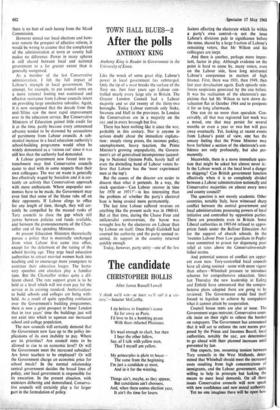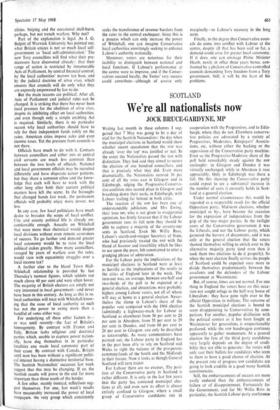After the polls
TOWN HALL BLUES-2 ANTHONY KING
Anthony King is Reader in Government in the University of Essex.
Like the wreck of some great ship, Labour's power in local government lies submerged. Only the tip of a mast breaks the surface of the Tory sea. Just four years ago Labour con- trolled nearly every large city in Britain. The Greater London Council had a Labour majority and so did twenty of the thirty-two boroughs. Today Labour controls only Stoke, Swansea and Hull in the provinces. In London the Conservatives are in a majority on the ot.c and in every borough but five.
There has been nothing like it since the war, probably in this century. Nor is anyone in serious doubt about the immediate explana- tion: steeply rising prices, the incomes policy, unemployment, heavy taxation, the Prime Minister's growing unpopularity, the Govern- ment's air of generalised incompetence (accord- ing to National Opinion Polls, barely half of even the dwindling band of Labour voters be- lieve that Labour has the 'most experienced men at the top').
But the causes of the disaster are easier to discern than what it portends. In a way, the stock question—'Can Labour recover in time for 1970 or 1971?'—is less interesting than the problem of whether the party's electoral base is being eroded more permanently.
The last time Labour suffered reverses on anything like the present scale was in 1960-61. But at that time, during the Clause Four and unilateralist controversies, the havoc was wrought less by the electorate on Labour than by Labour on itself. Once Hugh Gaitskell had asserted his authority and the party seemed re- united, its support in the country returned quickly enough.
Today, however, party unity—one of the few factors affecting the electorate which lie within a party's own control—is not the issue Labour's divisions pale in significance before the sense, shared by a large fraction of Labour's remaining voters, that Mr Wilson and his colleagues are inept.
And there is another, perhaps more impor- tant, factor in play. Although evidence on the point is hard to come by, many voters, even nn the Labour side, have long mistrusted Labour's competence in matters of high finance. First, there was 1931, then 1949, then last year devaluation again. Each episode rein- forces suspicions generated by the one before. It was his realisation of the electorate's sus- picions that led Mr Wilson to turn down de- valuation flat in October 1964 and to postpone it for so long afterwards.
One can do no more than. speculate. Con- ceivably, all that was registered last week was a mood, one that may persist for several months or even a year or two but will pass away eventually. Yet, looking at recent events from Labour's point of view, one has the uneasy feeling that the Prime Minister may have forfeited a section of the electorate's con- fidence not only profoundly, but also per- manently.
Meanwhile, there is a more immediate ques- tion that might be asked but almost never is : Is the Labour wreck at the local level a danger to shipping? Can British government function effectively when it is so completely divided between a Labour administration nationally and Conservative majorities on almost every town and county council?
The question is not merely academic. Other countries, notably Italy, have witnessed sharp conflict between the central government and local administrations possessing powers of local initiative and controlled by opposition parties. There are precedents even in Britain. Some Liberal authorities in 1903-04 refused to appro- priate funds under the Balfour Education Act for the support of church schools. In the 'twenties Labour Poor Law guardians in Poplar were committed to prison for dispensing poor relief at rates above the Conservative-estab- lisfied norms.
And potential sources of conflict are appar- ent even now. Tory-controlled local councils have all along resisted—some with more vigour than others—Whitehall pressure to introduce schemes for comprehensive education. Since last Thursday the new leadership at Ealing and Enfield have announced that the compre- tiensive plans adopted there are going to be reviewed. The Government could find itself forced to legislate to achieve by compulsion what it cannot attain by cooperation.
Council house rents are also at issue. The Government urges restraint; Conservative coun- cils insist on their right to relieve the burden on ratepayers. The Government has announced that it will act to enforce the rent norms pro- posed by the Prices and Incomes Board; local authorities, notably the GL.C, are determined to go ahead with their planned increases until prevented by law.
One expects, too, mounting tension between Tory councils in the West Midlands, deter- mined that Whitehall should meet the increased costs resulting from high concentrations of immigrants, and the Labour government, quite willing to help in principle but lacking the means to meet local demands. On all these issues Conservative councils will now speak with new confidence and new moral authority.
Yet no one imagines there will be open hos- tilities. Sniping and the occasional shell-burst, perhaps, but not trench warfare. Why not?
Part of the explanation is legal. As J. G. Bulpitt of Warwick University has pointed out, what Britain enjoys is not so much local self- government as 'local self-administration.' The new Tory councillors will find what their pre- decessors have discovered already: that their range of action is restricted by innumerable Acts of Parliament, by central financial control, by the local authorities' narrow tax base, and by the judicial doctrine of ultra vires, which ensures that councils will do only what they are expressly empowered by law to do.
But the main reasons are political. After all, Acts of Parliament and judicial rules can be changed. It is striking that there has never been local pressure for the abolition of ultra vires, despite its inhibiting effect on local authorities, and even though only a simple enabling Act is required. Similarly, there is no particular reason why local authorities should have to
rely for their independent funds solely on the rates; American cities impose sales and even income taxes. Yet the pressure from councils is not there., Officials have much to do with it. Contacts between councillors and either MPS or central
civil servants are much less common than between the two levels of officials. National and local government officials may be recruited differently and have disparate career patterns, but they share a common ethos and the know- ledge that each will have to work with the other long after both their current political masters have left the scene. In the boroughs that changed hands last week, the permanent officials will probably enjoy more power, not less.
In any case, few local politicians have much desire to broaden the scope of local conflict. City and county political life is already un- comfortable enough. Assaults on Whitehall that were more than rhetorical would deepen local divisions without even remote assurances of success. To go further and demand greater local autonomy would be to raise the local political stakes greatly. How many councillors, ravaged by years of warfare over the rates, would view with equanimity struggles over a local income tax?
A further clue to the bland Town Hall- Whitehall relationship is provided by last Thursday's turnout figures, which seldom ran much above 40 per cent and were often lower. The majority of British electors are simply not very interested in local government—and never have been in this century. As long as this is so, local authorities will treat with Whitehall know- ing that the issue of local authority as such has not the power to swing more than a handful of votes either way.
For underlying all these other factors is— or was until recently—the fact of Britain's homogeneity. By contrast with France and Italy, Britain lacks religious and doctrinal parties which, unable to capture power nation- ally, have dug themselves in in particular localities and made local autonomy part of their cause. By contrast with Canada, Britain until now has been without a significant politi- cal interest having a distinctive territorial base. The Scottish Nationalists' successes last week suggest that this may be changing. If so, the Scottish results will prove in the end far more important than those south of the border.
A few other. mainly ironical, reflections sug- gest themselves. For one, last week's results have measurably increased the power of local ratepayers. the very group which consistently seeks the transference of revenue burdens from the rates to the central exchequer. Since this is a process which can only increase the power of Whitehall, one can imagine Conservative local authorities unwittingly seeking to enhance Labour's authority nationally.
Moreover, voters are notorious for their inability to distinguish between national and local functions. If Labour's performance at the centre were to improve, and if the Conser- vatives succeed locally, the Tories' very success could contribute—although of course only marginally—to Labour's recovery in the long term.
Finally, to the degree that Conservative coun- cils do come into conflict with Labour at the centre, despite all that has been said so far, a demand could arise for greater local autonomy. If it does, one can envisage Prime Minister Heath, newly in office three years hence, con- fronted by a phalanx of Conservative-controlled councils demanding Tory freedom from a Tory government. Still, it will be the least of his problems.







































 Previous page
Previous page